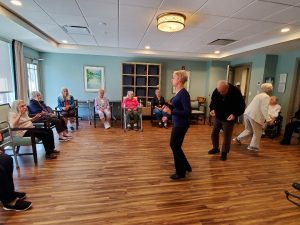In the early days of ADSLA, most of my clients were the same age as me – that is, the adult children of senior parents. Now I am in my 60s and most of the clients who seek ADSLA services for their loved ones are in their 40s and 50s. That being said, I have never sensed any sort of bad attitude toward me for this reason. I guess it’s because clients know I have been around the block a few times during the past 20 years. Clients and their older loved ones actually appear relieved when they see I am not a kid.
While not a kid, and often only 5 or 6 years younger than the senior for whom I am providing services, I do strive to stay young by dancing and playing the harp in my free time and by working hard on behalf of my clients. I pride myself on the fact that I was taught the right way to do things in a Catholic continuing care retirement community. I was trained by a taskmaster 10 years younger than me, and I worked under the scrutiny of nuns who wanted to do it their way, which was the same way as when the community opened in 1950. Now, being closer in age to my elder clients, it sometimes puts things into a totally different perspective for me.
The client I have in mind as I share these thoughts is a 72-year-old woman who has been diagnosed with Lewy Body Dementia. As the Mayo Clinic explains, Lewy body dementia is the second most common type of dementia after Alzheimer’s disease. Protein deposits called Lewy bodies develop in nerve cells in the brain. These deposits affect brain regions involved in thinking, memory and movement. Mental abilities in persons with Lewy body dementia gradually get worse over time. The afflicted senior might see things that aren’t there (i.e., have visual hallucinations) or experience symptoms akin to those of Parkinson’s disease: rigid muscles, slow movement, and tremors. Unfortunately, as Lewy Body Dementia progresses, the person with the disease exhibits behaviors that are erratic and can even become violent.
 Chicago Senior Living Advisors Blog
Chicago Senior Living Advisors Blog



